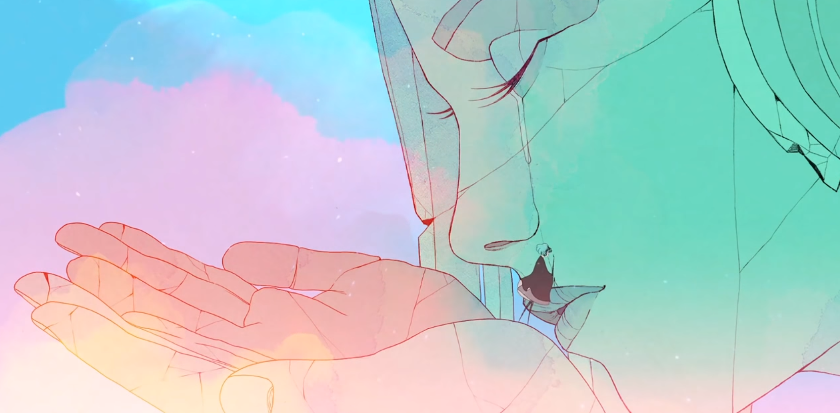
Gris and the problem of symbolic hurt
Some games have an identity crisis. Let’s call them “art games”. It’s a reductive attempt to genre-fy, but I use it to describe games that try to tell a story in metaphors rather than addressing the real thing.
Gris is one such game. It takes clear inspiration from Journey, easy to spot particularly in the early parts of the game. While Gris does try to evoke a certain emotional reaction purposefully, Journey, while still letting pictures speak for itself, is more successful in leaving the interpretation up to the player, avoiding the expression of any fixed emotional state.
In Journey, the world prior to your involvement isn’t sad or broken, and neither are you. You’re going on a journey, not a quest with some sort of objective, whereas Gris assumes that the status quo can only be achieved with you taking action.
Gamification of feelings through metaphors isn’t a new concept, but some games push their emotional objective with such force it almost seems like the player’s moral obligation to set things right. In Hellblade, Senua faces horrors with no way of knowing whether they are real or imagined, facing her very real psychosis but overcome it in a way that could be imagined. You have to push on, however, because you need to expose her to whatever is out there and drive rehabilitation. Don’t you want to help your character feel better? In Gris, you’re a force that returns beauty to a grey world and put together what has come apart. It’s an entirely unspecific but easily understandable metaphor, using the gaming experience as another fictional blueprint to getting out of the hole, of mending, helping.
Perhaps the reason art games employ this way of storytelling is because some themes like grief and loss are still difficult to marry with certain gameplay styles. This way of dealing with emotional trauma may be preferable because it’s impersonal. Everyone can find a situation in their own life they can liken to a vague metaphor, but including such metaphors to imbue a game with meaning can feel like an attempt at validation. Why does this game exist? Because it’s more than just pretty, someone will tell you, it’s profound. You learn to empathize and gain the resolve to make your own changes, because it’s not just a game but a lasting experience that will have a positive impact on your life. In trying to ascertain that everyone understands this, there is a certain insecurity. Gris feels like its seeking validation, a story alluded to where no story is needed. The game’s visuals attract a certain group of players, and with additional validation you can win over those who long for something more substantial, to tick another box for something a game should also stand out with: gameplay mechanics, story, difficulty and so forth.
Art can be its own reward, however, even when it’s completely devoid of meaning or you aren’t able to connect with the intended message. Gris is a beautiful game, but what I have encountered in coverage surrounding it is an often apologetic, almost contrite tone – “it’s a beautiful game, but it’s intended message didn’t reach me.”
Gris is a beautiful game. It is aware that it’s a beautiful game, too, which allows for precision-engineered moments of beauty that make you want to put them on your wall. It understands the value of music as a complimenting force rather than background accompaniment, and it makes a compelling case for an art style I haven’t encountered in games yet, which is likely what drew many people to it in the first case.
It’s designed with love. Just like a good exhibition of paintings, Gris can feel enriching for just its beauty, for allowing you to spend a few calm hours with something aesthetically pleasing. Time spent with something beautiful is still time well spent, and by giving your images a certain meaning, you can unintentionally take away from the conclusions players can draw for themselves. This way, Gris inhabits an interesting paradox – it expresses itself symbolically, leaving itself open to interpretation, while at the same time offering an interpretation for what you experience, expecting a particular emotional response in return.
Some games concentrated fully on making you a sort of interactive spectator, thus conveying the idea that both interacting with and simply looking at something can be its own reward. One such game is Abzû, which really only encourages you to bring some light to the dark world under the sea, so you have a way to appreciate everything that’s going on there, everything that exists regardless of your intervention. By rescuing a shark, you prove yourself as a non-threatening element in an ecosystem that is welcoming at times, completely disinterested in you at others. Everything is active, but not necessarily interactive. Your job is to look and appreciate.
The premise of being touched by an emotional story raised expectations for Gris to a point where some players apologetically noted that the metaphor alone didn’t stir them. Gris is a great game, but it’s telling that a game tries to attach deeper meaning to calm than we ever do about shooting things on screen.
Gris’ attempt to evoke emotion fails due to its open metaphorical approach as much as its need to evoke any feeling, not trusting the player enough to find meaning for themselves. To evoke emotion, sometimes you can and should be more specific than to suggest that a loss of some kind occurred or that hopelessness, disguised as a world full of broken bridges and darkness, took over. Games such as Gone Home, Night in the Woods and Celeste have done it by bluntly spelling out their character’s fears. Gris is a radically different game, and as such it’s limited in what it can and to an extent should say. Meditative experiences have worth, especially if sometimes the emotional labor games ask of you can be too much to handle.
I had a good time with Gris, no more and no less. I would have liked for me to be more committed to the experience.





